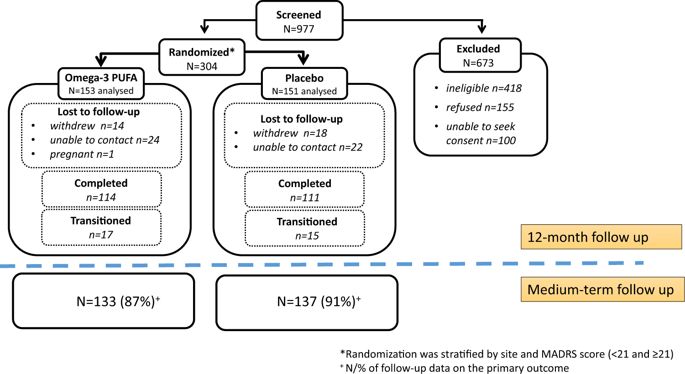npj Schizophrenia ( IF 5.7 ) Pub Date : 2018-06-25 , DOI: 10.1038/s41537-018-0052-x B. Nelson , G. P. Amminger , H. P. Yuen , C. Markulev , S. Lavoie , M. R. Schäfer , J. A. Hartmann , N. Mossaheb , M. Schlögelhofer , S. Smesny , I. B. Hickie , G. Berger , E. Y. H. Chen , L. de Haan , D. H. Nieman , M. Nordentoft , A. Riecher-Rössler , S. Verma , A. Thompson , A. R. Yung , P. D. McGorry

|
This study reports a medium-term follow-up of a randomised, double-blind, placebo-controlled trial of omega-3 polyunsaturated fatty acids (PUFA) in ultra-high risk for psychosis (UHR) patients. Primary outcomes of interest were transition to psychosis and symptomatic and functional outcome. A secondary aim was to investigate clinical predictors of medium-term outcome. Three hundred four UHR participants were recruited across 10 specialised early psychosis services in Australia, Asia, and Europe. The intervention consisted of 1.4 g/daily of omega-3 PUFA or placebo, plus up to 20 sessions of cognitive-behavioural case management (CBCM), over the 6-month study period, with participants receiving further CBCM sessions on basis of need between months 6–12. Mean time to follow-up was 3.4 (median = 3.3; SD = 0.9) years. There was a modest increase in transitions between 12-month and medium-term follow-up (11–13%) and substantial improvement in symptoms and functioning between baseline and follow-up, with no differences between the treatment groups. Most improvement had been achieved by end of the intervention. 55% of the sample received mental health treatment between end of intervention and follow-up. Omega-3 PUFA did not provide additional benefits to good quality psychosocial intervention over the medium term. Although most improvement had been achieved by end of intervention the substantial rates of post-intervention mental health service use indicate longer-term clinical need in UHR patients. The post-intervention phase treatment or the longer-term effect of CBCM, or a combination of the two, may have contributed to maintaining the gains achieved during the intervention phase and prevented significant deterioration after this time.
中文翻译:

NEURAPRO:患有精神病的极高风险年轻人中的omega-3多不饱和脂肪酸与安慰剂的多中心RCT —中期随访和临床过程
这项研究报告了一项针对超高风险精神病(UHR)患者的omega-3多不饱和脂肪酸(PUFA)随机,双盲,安慰剂对照试验的中期随访。感兴趣的主要结局是向精神病的过渡以及有症状和功能性结局。第二个目的是研究中期结果的临床预测指标。在澳大利亚,亚洲和欧洲的10个专门的早期精神病服务机构中招募了344名UHR参与者。在6个月的研究期内,干预措施包括每天1.4 g的omega-3 PUFA或安慰剂,外加多达20次认知行为病例管理(CBCM),参与者根据需要在6至12个月。平均随访时间为3.4年(中位数= 3.3; SD = 0.9)。在12个月和中期随访之间的过渡期有适度增加(11-13%),基线和随访之间症状和功能的改善显着,各治疗组之间无差异。干预结束时已取得最大的进步。在干预结束和随访之间,有55%的样本接受了心理健康治疗。中期而言,Omega-3 PUFA并未对优质的社会心理干预提供额外的好处。尽管在干预结束前已取得最大的改善,但干预后精神卫生服务的使用率很高,这表明UHR患者需要长期的临床需求。干预后阶段治疗或CBCM的长期疗效,或两者结合,









































 京公网安备 11010802027423号
京公网安备 11010802027423号